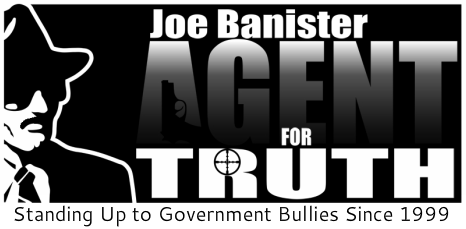Precautionary Considerations
So many people, once they learn the truth about the deceitful manner the federal income tax is administered and enforced, are tempted to change their conduct in connection with the IRS and the federal income tax (i.e., stop filing federal income tax returns, stop paying federal income tax) but fail to properly educate themselves about, and prepare themselves for, the combative environment that could very well ensue once the IRS realizes they have changed their income tax return filing or income tax paying conduct. Too many people jump in to what is really an extremely complex arena without knowing exactly what they are doing or how the entrenched federal income tax enforcement apparatus might attack them in the future. An attorney informally provided some food for thought with regard to just one aspect that is crucial to preparing for combat with the IRS, an agency hell-bent on preserving the status quo, that being how sturdy and workable your defense will be against a criminal investigation that could very well lead to a criminal prosecution.
Obviously, for a criminal case conviction, willfulness is the mens rea, and it requires:
1. The law imposes a duty on the Defendant
2. The Defendant knew about this duty
3. The Defendant intentionally and voluntarily violated that duty.
In the most well-known and authoritative U.S. Supreme Court case on the topic of the proof of willfulness necessary to convict a person of a willful violation of an income tax law, Cheek v. United States, 498 U.S. 192 (1991), the Supreme Court held that a jury must decide whether the Defendant held a subjective belief that the law did not require him to file or pay, or do whatever was required of him under the law. And if the Defendant holds the subjective belief in good faith, he can’t have acted willfully.
If the defendant believes that the tax laws are unconstitutional, and therefore not applicable to him, this is not a good faith belief that he is not required to file, not required to pay, or otherwise not required to do something under the tax laws. The theory the Supreme Court used for this seemingly contradictory conclusion is that if you say a law is constitutional, you tacitly admit you know what the statute says and requires of you, and you carefully considered that it doesn’t apply to you under the constitution. Many believe that a constitutionally-based belief should be treated the same as some other “statutory-based” belief, but the Supreme Court explicitly excluded constitutionally-based beliefs. Here’s the Supreme Court's reasoning:
“Claims that some of the provisions of the tax code are unconstitutional are submissions of a different order. They do not arise from innocent mistakes caused by the complexity of the Internal Revenue Code. Rather, they reveal full knowledge of the provision at issue and a studied conclusion, however wrong, that those provisions are invalid and unenforceable.” Cheek, p. 205. This section of the Cheek case concluded with this: “We thus hold that, in a case like this, a defendant’s views about the [constitutional] validity of the tax statutes are irrelevant to the issue of willfulness [and] need not be heard by the jury.” Cheek, p. 206.
So, keep in mind that a defendant being criminally prosecuted for violating a federal income tax law or laws, who acted according to a belief that such law or laws are unconstitutional, will be prohibited from expressing that belief as a defense in their trial.
There are similar prohibitions against a defendant whose defense revolves around a belief that a tax is immoral or taxes are spent for immoral purposes.
The moral to the story is that you should learn how you can defend yourself before you are thrust into a conflict rather than once you are already in the conflict.
